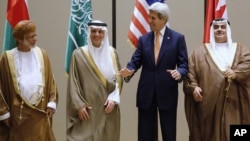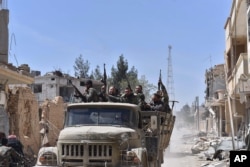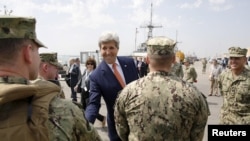The U.S. and Gulf allies have a shared concern about "Iran's destabilizing actions in the region," said Secretary of State John Kerry on Thursday, following talks with Gulf Cooperation Council (GCC) ministers.
"We will continue to push back" against such provocations, said Kerry, during an appearance with Saudi Foreign Minister Adel al-Jubeir.
He commented following a series of talks on regional security issues with Bahraini and GCC officials.
Jubeir, speaking on behalf of the six-state GCC, said that if Iran wanted normal relations with the regional body, it would have to change its policies.
Iranian missiles, proxy fighters
Since September, military ships have intercepted four vessels containing weapons that were believed to have come from Iran. All were believed intended for Houthi rebels in Yemen.
The most recent incident took place in late March. The U.S. Navy said it seized AK-47 rifles, rocket-propelled grenade launchers and machine guns from a dhow off the coast of Oman.
Also, Tehran has repeatedly tested ballistic missiles. U.S. officials say the tests do not violate the nuclear agreement, but are a U.N. Security Council resolution violation.
Earlier Thursday, Bahrain's foreign minister said Iran needs to change its foreign policy in the region and stop weapons shipments, training "terrorists" and financing and supporting "proxies."
Khalid bin Ahmed Al Khalifa said Tehran needed to devote as much effort to its neighbors as it did to securing the nuclear agreement with the United States and five other world powers.
Gulf leaders had begun raising concerns about Iran's destabilizing activity in the region before the deal was implemented in January. It is an issue the Obama administration has been addressing with Gulf leaders since a 2015 summit at Camp David.
"The fact of the matter is that, notwithstanding our reassuring rhetoric, U.S. actions have not tempered Iranian behavior in Yemen, Syria, Iraq, Bahrain or Saudi Arabia," said Adam Ereli, a former U.S. Ambassador to Bahrain.
"Unless and until our Arab Gulf allies see the U.S. match words with deeds, they will remain appropriately skeptical," he added.
U.S. expands aid to Yemen
Kerry also announced new aid for Yemen, where a U.S.-backed Saudi-led coalition has been leading airstrikes against Houthi rebels.
He said the U.S. Food for Peace Program would provide $139 million in new funding this year to assist with humanitarian efforts.
Bahrain's rights record questioned
Bahrain's human rights record was a focal point during Kerry's appearance with Al Khalifa.
He was asked about the case involving Zainab al-Khawaja, a political activist who was detained with her young son last month.
Al Khalifa said the woman chose to keep her son with her in detention.
He also said she would be released "pending her case in the court."
Without specifically addressing the case, Kerry said Bahrain had made progress in some areas, but that more work remained.
Regional conflict discussed
The main goal of Kerry's visit to Bahrain is to lay the groundwork for President Barack Obama's attendance at the April 21 GCC summit in Saudi Arabia.
Kerry and Gulf ministers also discussed the status of the cessation of hostilities and political talks in Syria, as well as efforts to combat Islamic State militants.
Kerry visits U.S. Navy base
Kerry also visited the U.S. Navy base in Bahrain that is the headquarters for both the Fifth Fleet and a multinational force that deals with maritime security and combats piracy.
"The core of the focus is the destruction of Daesh, ISIL," said Kerry to military personnel at the base, referring to Islamic State.
"You are all central to our ability to do this," he added.
Bahrain is the first stop of a weeklong trip for Kerry. Later, he travels to Hiroshima, Japan, where he will attend a G7 ministerial meeting and visit a World War II memorial.







